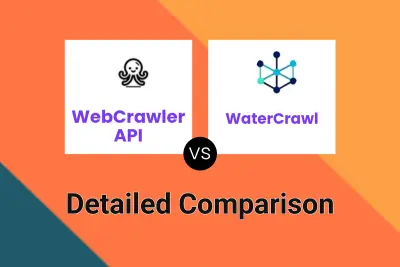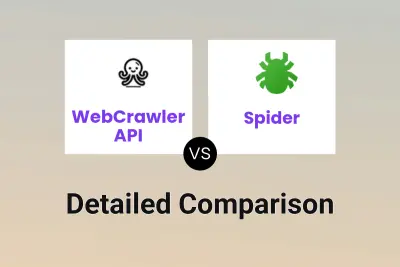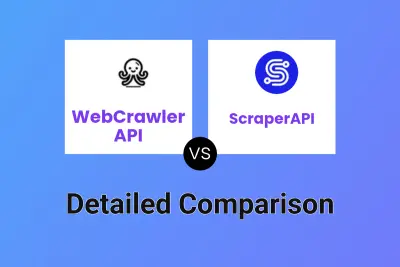 WebCrawler API
VS
WebCrawler API
VS
 Extractor API
Extractor API
WebCrawler API
Navigating the complexities of web crawling, such as managing internal links, rendering JavaScript, bypassing anti-bot measures, and handling large-scale storage and scaling, presents significant challenges for developers. WebCrawler API addresses these issues by offering a simplified solution. Users provide a website link, and the service handles the intricate crawling process, efficiently extracting content from every page.
This API delivers the scraped data in clean, usable formats like Markdown, Text, or HTML, specifically optimized for tasks such as training Large Language Model (LLM) AI models. Integration is straightforward, requiring only a few lines of code, with examples provided for popular languages like NodeJS, Python, PHP, and .NET. The service simplifies data acquisition, allowing developers to focus on utilizing the data rather than managing the complexities of crawling infrastructure.
Extractor API
Extractor API is a service designed to extract clean text data and metadata from various online sources, including articles, structured and unstructured webpages, and PDF documents. It leverages Artificial Intelligence, specifically offering an LLM-powered extraction capability, to handle complex extraction requirements. The platform manages technical challenges such as IP rotation, JavaScript rendering, and request retries, allowing users to focus solely on obtaining the desired data without managing local libraries or infrastructure complexities.
This tool functions both as a robust API for programmatic integration and as a user-friendly online visual tool for manual extraction tasks. Users can paste or upload URLs directly into the online interface. Extractor API is positioned as a foundational tool for collecting data efficiently, particularly for training AI/ML models and building comprehensive knowledge bases. It simplifies the process of gathering clean, boilerplate-free text and associated details from diverse web content and documents.
Pricing
WebCrawler API Pricing
WebCrawler API offers Usage Based pricing .
Extractor API Pricing
Extractor API offers Freemium pricing .
Features
WebCrawler API
- Automated Web Crawling: Provide a URL to crawl entire websites automatically.
- Multiple Output Formats: Delivers content in Markdown, Text, or HTML.
- LLM Data Preparation: Optimized for collecting data to train AI models.
- Handles Crawling Complexities: Manages JavaScript rendering, anti-bot measures (CAPTCHAs, IP blocks), link handling, and scaling.
- Developer-Friendly API: Easy integration with code examples for various languages.
- Included Proxy: Unlimited proxy usage included with the service.
- Data Cleaning: Converts raw HTML into clean text or Markdown.
Extractor API
- AI-Powered Extraction: Utilizes AI and LLMs for sophisticated data extraction.
- Robust API: Handles IP rotation, retries, and JavaScript rendering automatically.
- News Search API: Search global news articles via API calls.
- Comprehensive Data Extraction: Extracts clean text, raw text, HTML, and metadata.
- Visual Online Tool: Allows pasting or uploading up to 1,000 URLs for extraction without coding.
- Persistent Jobs: Saves extracted text results for later access.
- PDF Extraction: Supports automated data extraction from PDF documents.
Use Cases
WebCrawler API Use Cases
- Training Large Language Models (LLMs)
- Data acquisition for AI development
- Automated content extraction from websites
- Market research data gathering
- Competitor analysis
- Building custom datasets
Extractor API Use Cases
- Collecting training data for AI/ML models.
- Building knowledge bases from web content and documents.
- Extracting article text for content analysis or summarization.
- Scraping structured data from websites without managing infrastructure.
- Monitoring news articles related to specific topics.
- Converting PDF documents into structured text data.
Uptime Monitor
Uptime Monitor
Average Uptime
99.58%
Average Response Time
371.67 ms
Last 30 Days
Uptime Monitor
Average Uptime
99.86%
Average Response Time
120.73 ms
Last 30 Days
WebCrawler API
Extractor API
More Comparisons:
-

WebCrawler API vs WaterCrawl Detailed comparison features, price
ComparisonView details → -

WebCrawler API vs Extractor API Detailed comparison features, price
ComparisonView details → -

WebCrawler API vs Spider Detailed comparison features, price
ComparisonView details → -

WebCrawler API vs ScraperAPI Detailed comparison features, price
ComparisonView details →
Didn't find tool you were looking for?